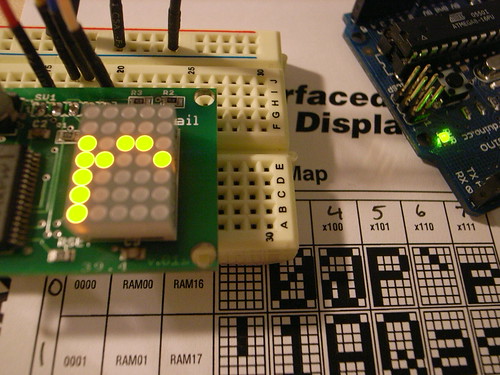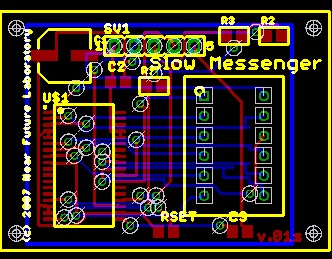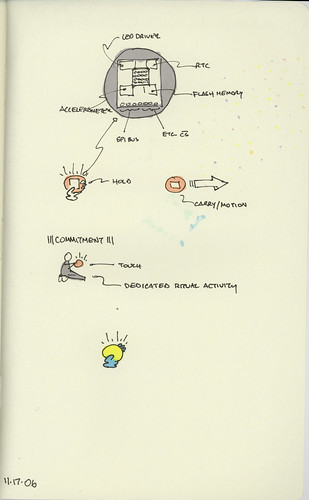
I’ve been fixated on a story my wandering mind told me many months ago about a little theory object that forced me to think about how the connected things in the era of IP networks always do their thing as fast as possible, approaching speeds that are imperceptible to normal humans. Almost without question, this is seen as a good thing. But I wondered what it would take to disrupt that assumption. How hard would the apparatus of connected things fight back? Would it be hard to write slow networked communications software? What is “slow” in the era of connected things? Can their be a slow instant messenger device?
I decided the best way to figure these questions all out was to sketch out what a super slow communications device might be, how it would operate, what it would create in terms of affect for those participating in the messaging, and what it could be “good” for.
Naturally enough, I ran up against all kinds of brick walls. Most people thought I had definitely gone completely misheggeneur. Why in the world would I want something that communicated really, really slow? Everything is supposed to be faster, quicker, more instant that last year’s instant. I mean, processor speeds keep flying through the roof. Broadband gets thicker and quicker. Rates go up when it comes to speed, not down. And I had no clear way to explain why I was drawn to this idea, other than trying to do the opposite of the dominant trend for the sake of seeing what other possibilities for connected digital networking there might be.
This may not be as weird an experiment as it sounds, particularly in an age where the Internet is splitting up into all kinds of tiers of service, with for-pay super high speed networks and bottom-tier, low-rent slow networks. Is it really safe to assume that we’ll always have fast networks available to us? Suppose you had to make a choice for economic reasons – you can send this E-FedEx for $43 and it’ll get there in 1200 milliseconds, or send it E-Postal for $3.19 and it’ll arrive sometime early next week, probably. I mean, it wouldn’t surprise me if this were a likely near-future world. It really wouldn’t.
So, how can slow be good? In my wandering mind I imagined a little device that slowly, very slowly, spilled a message out one letter at a time. Like a slow-scan signal from an interplanetary probe, feeding back a nice galactic photo over the course of 32 hours. Some of those messages might have a certain enjoyable anticipation to them — that’s a good thing..affect in messages where we’ve perhaps re-oriented our sense of affect for communication because we’ve been learning how to expect our communications faster or we expect less from our communication because most of the electronic kind gets all gummed up with crap and spam?
I’m also sort of speculating that this experiment might teach me more about how the “weight” of pre-digital interaction rituals can be re-invested with their pre-digital semantic heft even in the age of electronic mail. That is, can the momentum and weight (of time, of material things moving so as to make connections between people, of haptic/touch/proximity connections based on material coming in contact with things) imbue digital communications with something other than the transfer of information?
Boy, that’s out there. What I’m wondering is — what happens when I have to invest some material energy to get a message between (or from) someone and myself? That’s all this is — it takes three things to get the message going and finally delivered in its entirety.
1. Time, lots of it.
2. Commitment — the thing only works if I keep it close. If it’s off on its own, it slows down its delivery to glacial proportions.
3. Movement — I basically need to carry it with me wherever I go. And if I don’t go anywhere..if I sit at my computer all day, kind of like I did this entire afternoon and evening? That message just isn’t going to move anywhere.
At the end, perhaps a week or so, the message will start revealing itself, one character at a time.
Obviously, this is for the dedicated communicator, who enjoys the anticipation of a message from someone extra special.

Technorati Tags: Near Future Laboratory, slowest instant messenger, theory object

One thought on “World's Slowest Instant Messenger”
Comments are closed.